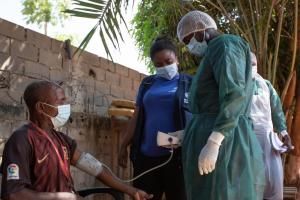Brazzaville, 18 May 2023 – Fewer than a third of people living with hypertension in the African region are on treatment, and only about 12% have the life-threatening condition under control, an analysis by World Health Organization (WHO) shows, says a WHO press release.
Globally, around 21% of adults aged over 30 years have hypertension under control, and 42% are taking medication for the condition. Hypertension is a major risk factor for stroke and heart attack—the cardiovascular diseases responsible for most deaths due to chronic illnesses in the African region.
In Africa, diagnosis, care and control of hypertension are constrained by low awareness about the condition, limited access to health services, overburdened health systems, health workforce challenges, lack of access to affordable medicines and non-compliance with drug regimens. Rising obesity rates, unhealthy lifestyles, along with insufficient patient education, compound the threat.
“Tackling this serious health threat requires stronger investment to increase access to health services to detect and manage the condition. It’s also vital to further raise awareness about hypertension and promote measures to address its modifiable risk factors,” said Dr Matshidiso Moeti, WHO Regional Director for Africa. “Across the region, we’re supporting countries to anchor initiatives aimed at decentralizing diagnosis, treatment and care of noncommunicable diseases, to improve well-being and curb deaths.”
WHO has prioritized its work with governments, partners and civil society to address the threat of hypertension and other noncommunicable diseases. Twenty-seven countries have been supported, through an approach known as WHO-PEN, to decentralize the management of noncommunicable disease, including hypertension, at primary health care level. Services include screening and diagnosis, treatment, lifestyle modification, patient education and self-management.
Building on WHO-PEN, in 2022 African countries adopted a strategy known as PEN-Plus. This approach aims to reinforce the capacity of district hospitals and other first-level referral facilities for early diagnosis and subsequent management of severe noncommunicable diseases, including complicated hypertension, to lower deaths.
The PEN-Plus strategy has shown promising results in Liberia, Malawi and Rwanda, with a significant increase in the number of people accessing treatment for severe chronic diseases.
WHO is also working with partner organizations to support countries in the African region to develop and implement regulatory standards and fiscal measures to promote healthy diets, physical activity and other positive behaviour changes. Tobacco and alcohol use, as well as being overweight or obese, are significant risk factors for hypertension.
“Although targeted initiatives are delivering success, further efforts are needed to lower the high burden of noncommunicable diseases in Africa,” Dr Moeti said. “Primary health facilities, which are on the frontline of health care and so ideally positioned to deliver health promotion and prevention services, must be fully supported and strengthened.”

